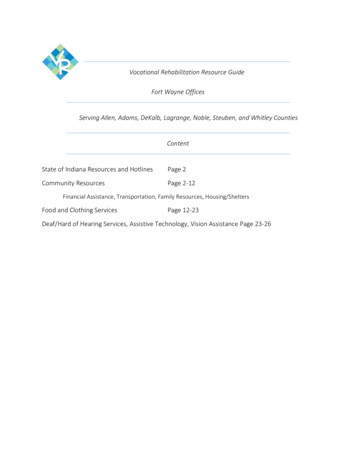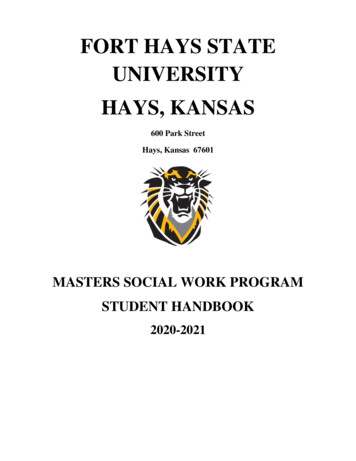
Transcription
FORT HAYS STATEUNIVERSITYHAYS, KANSAS600 Park StreetHays, Kansas 67601MASTERS SOCIAL WORK PROGRAMSTUDENT HANDBOOK2020-2021
Table of ContentsPROFESSIONAL SOCIAL WORK .3DEPARTMENT OF SOCIAL WORK .3SOCIAL WORK DEPARTMENT MISSION .4SOCIAL WORK DEPARTMENT VISION.4MSW PROGRAM GOALS .4MSW PROGRAM GENERALIST YEAR COMPETENCIES .4MSW DEGREE PATHWAYS .12MSW COURSE DESCRIPTIONS .16MSW PROGRAM POLICIES AND PROCEDURES .22APPLICATION FOR ADMISSION TO THE REGULAR MSW PATHWAY .22APPLICATION FOR ADMISSION TO THE .23ADVANCED STANDING MSW PATHWAY .23GUARANTEED ADVANCEMENT INTO THE .23ADVANCED STANDING MSW PATHWAY .23PROCEDURE FOR EVALUATING APPLICATIONS AND NOTIFYING STUDENTS OF THEADMISSIONS COMMITTEE DECISION .24PROVISIONAL ADMISSION POLICY .25DEFERRED CONSIDERATION OR DEFERRED ADMISSION .26MSW PROGRAM .27STUDENT TRANSFER POLICY AND PROCEDURE .27ACADEMIC CREDIT FOR LIFE EXPERIENCE .27AND PREVIOUS WORK EXPERIENCE POLICY .27MSW PROGRAM FEES .27FORT HAYS STATE UNIVERSITY .28MSW PROGRAM .28POLICY ON NONDISCRIMINATION .28GUIDELINES REGARDING SERVICES FOR PERSONS WITH DISABILITIES .28SOCIAL WORK PROGRAM .29STUDENT ADVISEMENT POLICIES AND PROCEDURES .29EVALUATING STUDENT ACADEMIC AND PROFESSIONAL PERFORMANCE .29STUDENT GRIEVANCE .30POLICIES AND PROCEDURES .30ACADEMIC HONESTY POLICY AND PROCEDURES .31SOCIAL WORK PROGRAM ACADEMIC PERFORMANCE POLICY AND PROCEDURES .33SOCIAL WORK PROGRAM PROFESSIONAL CONDUCT POLICY AND PROCEDURES .33ACADEMIC AND NON-ACADEMIC DISMISSAL APPEALS POLICY AND PROCEDURES .34ADMISSION REQUIREMENTS.35FOR THE FIELD PRACTICUM .35MSW PROGRAM .35EMPLOYMENT-BASED FIELD PRACTICUM POLICY .35TRANSFER OF STUDENTS FROM ONE .37PRACTICUM SETTING TO ANOTHER .37SOCIAL WORK CLUB .37PHI ALPHA HONOR SOCIETY .38SOCIAL WORK PROGRAM SHARED GOVERNANCE POLICY AND PROCEDURES .38ADDITIONAL RESOURCES.402Fort Hays State University Masters of Social Work Student Manual, 2020-21
PROFESSIONAL SOCIAL WORKWHAT WE DOClinical social workers are professionals who have many different roles. They assist people who needhelp in coping with complex interpersonal and social problems and assist them in obtaining the resourcesthey need to live with dignity. Clinical social workers provide services to people of any age, income,race, ethnicity, gender, religion and sexual orientation.The historic mission of social work has been to help people who are disadvantaged, disenfranchised andunderserved. The contemporary social worker also assists people from all walks of life, with all kinds ofconcerns, in all kinds of settings.WHERE WE ARE FOUNDSocial workers are generally found in: Child and Family Service AgenciesMental Health CentersHospitals and Health Care AgenciesPrivate PracticeSchoolsMilitary bases and the Veteran’s AdministrationNursing HomesWelfare AgenciesBusiness and IndustryDrug and Alcohol Treatment CentersResidential Treatment ServicesCommunity OrganizationsSocial workers are also involved in community action and community planning. Many take part in socialpolicy development or serve as elected public officials. A professional in the field ultimately tries toimprove social conditions by helping the community create and deliver services and support that manypeople need.HOW WE WORKAnyone seeking services from a professional social worker can expect a skilled practitioner who willlisten without making judgments, help identify problems and possible solutions, identify and link theindividual with resources, and provide assistance in helping people achieve their maximum potential.DEPARTMENT OF SOCIAL WORKThe Department of Social Work at Fort Hays State University offers a Baccalaureate of Social Work(BSW) degree and a Masters of Social Work (MSW) with a clinical specialization. The BSW programwas approved and adopted by the Board of Regents in February, 1995. The MSW program was approvedby the Board of Regents in May, 2019. The BSW program is accredited by the Council on Social WorkEducation through 2027. Similar to the FHSU Bachelors of Social Work Program, FHSU will seek and3Fort Hays State University Masters of Social Work Student Manual, 2020-21
secure CSWE accreditation for the MSW Program. As is the case with all new programs, the MSWProgram will launch in pre-candidacy status, and become eligible for full accreditation after completingthe candidacy process. Students who graduate from the program while it is in candidacy will retain afully accredited degree upon the program’s approval of accreditation following the candidacy period. TheMSW Program’s candidacy status will not delay nor prevent graduates from obtaining licensure.SOCIAL WORK DEPARTMENT MISSIONThe Department of Social Work educates students to become competent social workers who adhere toprofessional principles, values, and ethics, respond with compassion using critical thinking skills,evidence-based practice, respect for human diversity and individual strengths, in order to advocate forhuman and community well-being in Western Kansas and beyond.SOCIAL WORK DEPARTMENT VISIONThe Department of Social Work is recognized as the “Lighthouse on the Plains” with regard to socialwork education, research and support to professional practice.MSW MISSIONThe MSW program prepares graduate students to become competent clinical social workers who adhereto professional principles, values, and ethics, respond with compassion using critical thinking skills,evidence-based practice, respect for human diversity and individual strengths, in order to advocate forhuman and community well-being in Western Kansas and beyond.MSW PROGRAM GOALSTo actualize its mission, the MSW Program had adopted the following goals:1. Educate students to be competent and ethical clinical social work practitioners who deploy welldeveloped clinical skills to serve clients.2. Produce clinical social workers who utilize highly developed critical thinking skills and advancedknowledge, to apply evidence based practices in the advancement of well-being with all clientsystems.3. Prepare students for clinical social work practice with diverse populations and with client systems ofall sizes to advance human rights, social, economic, and environmental justice.4. Prepare students to become the next generation of leaders in human service agencies andcommunities who collaborate in the best interest and well-being of individuals, families, groups, andcommunities.5. Develop community partnerships to collaboratively address the behavioral health workforce needs inKansas and beyond.MSW PROGRAM GENERALIST YEAR COMPETENCIES1. Demonstrate Ethical and Professional Behavior4Fort Hays State University Masters of Social Work Student Manual, 2020-21
Social workers understand the value base of the profession and its ethical standards, as well asrelevant laws and regulations that may impact practice at the micro, mezzo, and macro levels. Socialworkers understand frameworks of ethical decision-making and how to apply principles of criticalthinking to those frameworks in practice, research, and policy arenas. Social workers recognizepersonal values and the distinction between personal and professional values. They also understandhow their personal experiences and affective reactions influence their professional judgment andbehavior. Social workers understand the profession’s history, its mission, and the roles andresponsibilities of the profession. Social Workers also understand the role of other professions whenengaged in inter-professional teams. Social workers recognize the importance of life-long learningand are committed to continually updating their skills to ensure they are relevant and effective. Socialworkers also understand emerging forms of technology and the ethical use of technology in socialwork practice. Social Workers: make ethical decisions by applying the standards of the NASW Code of Ethics, relevant laws andregulations, models for ethicaldecision-making, ethical conduct of research, and additional codes of ethics as appropriate to context;use reflection and self-regulation to manage personal values and maintain professionalism in practicesituations;demonstrate professional demeanor in behavior; appearance; and oral, written, and electroniccommunication;use technology ethically and appropriately to facilitate practice outcomes; anduse supervision and consultation to guide professional judgment and behavior2. Engage Diversity and Difference in PracticeSocial workers understand how diversity and difference characterize and shape the human experienceand are critical to the formation of identity. The dimensions of diversity are understood as theintersectionality of multiple factors including but not limited to age, class, color, culture, disabilityand ability, ethnicity, gender, gender identity and expression, immigration status, marital status,political ideology, race, religion/spirituality, sex, sexual orientation, and tribal sovereign status. Socialworkers understand that, as a consequence of difference, a person’s life experiences may includeoppression, poverty, marginalization, and alienation as well as privilege, power, and acclaim. Socialworkers also understand the forms and mechanisms of oppression and discrimination and recognizethe extent to which a culture’s structures and values, including social, economic, political, andcultural exclusions, may oppress, marginalize, alienate, or create privilege and power. SocialWorkers: apply and communicate understanding of the importance of diversity and difference in shaping lifeexperiences in practice at the micro, mezzo, and macro levels;present themselves as learners and engage clients and constituencies as experts of their ownexperiences; andapply self-awareness and self-regulation to manage the influence of personal biases and values inworking with diverse clients and constituencies.3. Advance Human Rights and Social, Economic, and Environmental Justice5Fort Hays State University Masters of Social Work Student Manual, 2020-21
Social workers understand that every person regardless of position in society has fundamental humanrights such as freedom, safety, privacy, an adequate standard of living, health care, and education.Social workers understand the global interconnections of oppression and human rights violations, andare knowledgeable about theories of human need and social justice and strategies to promote socialand economic justice and human rights. Social workers understand strategies designed to eliminateoppressive structural barriers to ensure that social goods, rights, and responsibilities are distributedequitably and that civil, political, environmental, economic, social, and cultural human rights areprotected. Social Workers: apply their understanding of social, economic, and environmental justice to advocate for human rightsat the individual and system levels; andengage in practices that advance social, economic, and environmental justice.4. Engage in Practice-informed Research and Research-informed PracticeSocial workers understand quantitative and qualitative research methods and their respective roles inadvancing a science of social work and in evaluating their practice. Social workers know theprinciples of logic, scientific inquiry, and culturally informed and ethical approaches to buildingknowledge. Social workers understand that evidence that informs practice derives from multidisciplinary sources and multiple ways of knowing. They also understand the processes for translatingresearch findings into effective practice. Social Workers: use practice experience and theory to inform scientific inquiry and research;apply critical thinking to engage in analysis of quantitative and qualitative research methods andresearch findings; anduse and translate research evidence to inform and improve practice, policy, and service delivery5. Engage in Policy PracticeSocial workers understand that human rights and social justice, as well as social welfare and services,are mediated by policy and its implementation at the federal, state, and local levels. Social workersunderstand the history and current structures of social policies and services, the role of policy inservice delivery, and the role of practice in policy development. Social workers understand their rolein policy development and implementation within their practice settings at the micro, mezzo, andmacro levels and they actively engage in policy practice to effect change within those settings. Socialworkers recognize and understand the historical, social, cultural, economic, organizational,environmental, and global influences that affect social policy. They are also knowledgeable about theformulation, analysis, implementation, and evaluation of policy that supports service programs.Social Workers: Identify social policy at the local, state, and federal level that impacts well-being, service delivery,and access to social services;assess how social welfare and economic policies impact the delivery of and access to social services;apply critical thinking to analyze, formulate, and advocate for policies that advance human rights andsocial, economic, and environmental justice.6Fort Hays State University Masters of Social Work Student Manual, 2020-21
6. Engage with Individuals, Families, Groups, Organizations, and CommunitiesSocial workers understand that engagement is an ongoing component of the dynamic and interactiveprocess of social work practice with, and on behalf of, diverse individuals, families, groups,organizations, and communities. Social workers value the importance of human relationships. Socialworkers understand theories of human behavior and the social environment, and critically evaluateand apply this knowledge to facilitate engagement with clients and constituencies, includingindividuals, families, groups, organizations, and communities. Social workers understand strategies toengage diverse clients and constituencies to advance practice effectiveness. Social workersunderstand how their personal experiences and affective reactions may impact their ability toeffectively engage with diverse clients and constituencies. Social workers value principles ofrelationship-building and inter-professional collaboration to facilitate engagement with clients,constituencies, and other professionals as appropriate. Social Workers: apply knowledge of human behavior and the social environment, person-in-environment, and othermultidisciplinary theoretical frameworks to engage with clients and constituencies; anduse empathy, reflection, and interpersonal skills to effectively engage diverse clients andconstituencies.7. Assess Individuals, Families, Groups, Organizations, and CommunitiesSocial workers understand that assessment is an ongoing component of the dynamic and interactiveprocess of social work practice with, and on behalf of, diverse individuals, families, groups,organizations, and communities. Social workers understand theories of human behavior and the socialenvironment, and critically evaluate and apply this knowledge in the assessment of diverse clients andconstituencies, including individuals, families, groups, organizations, and communities. Socialworkers understand methods of assessment with diverse clients and constituencies to advance practiceeffectiveness. Social workers recognize the implications of the larger practice context in theassessment process and value the importance of inter-professional collaboration in this process. Socialworkers understand how their personal experiences and affective reactions may affect theirassessment and decision-making. Social Workers: collect and organize data, and apply critical thinking to interpret information from clients andconstituencies;apply knowledge of human behavior and the social environment, person-in-environment, and othermultidisciplinary theoretical frameworks in the analysis of assessment data from clients andconstituencies;develop mutually agreed-on intervention goals and objectives based on the critical assessment ofstrengths, needs, and challenges within clients and constituencies; andselect appropriate intervention strategies based on the assessment, research knowledge, and valuesand preferences of clients and constituencies.8. Intervene with Individuals, Families, Groups, Organizations, and CommunitiesSocial workers understand that intervention is an ongoing component of the dynamic and interactiveprocess of social work practice with, and on behalf of, diverse individuals, families, groups,organizations, and communities. Social workers are knowledgeable about evidence-informedinterventions to achieve the goals of clients and constituencies, including individuals, families,7Fort Hays State University Masters of Social Work Student Manual, 2020-21
groups, organizations, and communities. Social workers understand theories of human behavior andthe social environment, and critically evaluate and apply this knowledge to effectively intervene withclients and constituencies. Social workers understand methods of identifying, analyzing andimplementing evidence-informed interventions to achieve client and constituency goals. Socialworkers value the importance of inter-professional teamwork and communication in interventions,recognizing that beneficial outcomes may require interdisciplinary, inter-professional, and interorganizational collaboration. Social Workers: critically choose and implement interventions to achieve practice goals and enhance capacities ofclients and constituencies;apply knowledge of human behavior and the social environment, person-in-environment, and othermultidisciplinary theoretical frameworks in interventions with clients and constituencies;use inter-professional collaboration as appropriate to achieve beneficial practice outcomes;negotiate, mediate, and advocate with and on behalf of diverse clients and constituencies; andfacilitate effective transitions and endings that advance mutually agreed-on goals.9. Evaluate Practice with Individuals, Families, Groups, Organizations, and CommunitiesSocial workers understand that evaluation is an ongoing component of the dynamic and interactiveprocess of social work practice with, and on behalf of, diverse individuals, families, groups,organizations and communities. Social workers recognize the importance of evaluating processes andoutcomes to advance practice, policy, and service delivery effectiveness. Social workers understandtheories of human behavior and the social environment, and critically evaluate and apply thisknowledge in evaluating outcomes. Social workers understand qualitative and quantitative methodsfor evaluating outcomes and practice effectiveness. Social Workers: select and use appropriate methods for evaluation of outcomes;apply knowledge of human behavior and the social environment, person-in-environment, and othermultidisciplinary theoretical frameworks in the evaluation of outcomes;critically analyze, monitor, and evaluate intervention and program processes and outcomes; andapply evaluation findings to improve practice effectiveness at the micro, mezzo, and macro levels.MSW PROGRAM SPECIALIZED CLINICAL YEAR COMPETENCIESCompetency 1: Demonstrate Ethical and Professional BehaviorClinical social workers understand the value base of the profession and its ethical standards, as well asrelevant laws and regulations that may impact clinical practice at the micro and mezzo levels. Clinicalsocial workers recognize personal values and the distinction between personal and professional values.They also understand how their personal experiences and affective reactions influence their professional8Fort Hays State University Masters of Social Work Student Manual, 2020-21
judgment and behavior. Clinical social workers understand emerging forms of technology and the ethicaluse of technology in clinical social work practice. Clinical social workers complete ethical decisionmaking and are able to demonstrate this understanding through ethical behavior in practice settings.Clinical social workers: make ethical decisions by applying the standards of the NASW Code of Ethics, relevant laws andregulationsdemonstrate professional use of self in behavior; appearance; and oral, written, and electroniccommunicationuse supervision and consultation to guide professional judgment and behaviorunderstand and identify personal and professional strengths, limitations and challengesemploy strategies of ethical reasoning to address the use of technology in clinical practice and itsimpact on client rights and wellbeingCompetency 2: Engage Diversity and Difference in PracticeClinical social workers understand how diversity and difference characterize and shape the humanexperience and are critical to the formation of identity. Clinical social workers understand that aspects ofdiversity bring enriching and powerful experiences and as a consequence of difference, each person’s lifeexperience is unique and valuable. Clinical social workers also understand the forms and mechanisms ofoppression and discrimination and recognize the extent to which a culture’s structures and values,including social, economic, political, and cultural exclusions, may oppress, marginalize, alienate, orcreate privilege and power. Regardless of their background and the clients’ background, clinical socialworkers are able to effectively partner with clients to improve their well-being. Clinical social workers areable to thoughtfully engage in reflection on their own culture experiences and recognize the influencesthese have on the professional relationship.Clinical social workers: apply and communicate understanding of the importance of diversity and difference in shaping lifeexperiences in clinical practice at the micro and mezzo levelswork effectively with diverse populations utilizing clients and constituencies as experts of their ownexperiencesresearch and apply knowledge of diverse populations to enhance client wellbeingdevelop a culturally responsive therapeutic relationshipCompetency 3: Advance Human Rights and Social, Economic, and Environmental JusticeClinical social workers understand the ideal that every person has fundamental human rights. Clinicalsocial workers are knowledgeable about theories of human need and social justice. Clinical socialworkers help clients understand and develop strategies to eliminate oppressive structural barriers in theirenvironment. Clinical social workers understand personal and historical injustices related to human rights,social, economic and environmental justice and are able to serve as a guide to clients through their ownexploration.Clinical social workers:9Fort Hays State University Masters of Social Work Student Manual, 2020-21
demonstrate knowledge of client vulnerability as it relates to client well-being at the individual andsystem levelsuse knowledge of the effects of oppression and discrimination on client and client systems to guidetreatment planning and interventionCompetency 4: Engage in Practice-informed Research and Research-informed PracticeClinical social workers understand evidence that informs clinical practice derives from multi-disciplinarysources and multiple ways of knowing. Clinical social workers utilize the principles of logic, scientificinquiry, cultural humility, and ethical approaches in the acquisition of knowledge. They also understandthe processes for translating research findings into effective clinical practice.Clinical social workers: use clinical practice experience and theory to inform scientific inquiry and research to guide clinicalpracticeuse and translate research evidence to inform and improve clinical practice, policy, and servicedeliveryCompetency 5: Engage in Policy PracticeClinical social workers understand that policy and its implementation at the federal, state, and local levelsimpacts client experiences. Clinical social workers recognize that policy has social, cultural, economic,organizational, and environmental effects. Clinical social workers recognize that policy can eitherempower or marginalize clients.Clinical social workers understand the need for ethical policy and can create and implement policy withintheir clinical practice settings.Clinical social workers: identify social policy at the local, state, and federal level that impacts clinical social work practice atthe organizational leveldemonstrate understanding of the implications of policies and policy change in the lives of clients,and show awareness of its contextual influences on clients’ life experiencesCompetency 6: Engage with Individuals, Families, Groups, and OrganizationsClinical social workers understand that the therapeutic relationship is an essential and ongoing componentof clinical social work practice. Clinical social workers recognize the value of human relationships indeveloping strategies to engage diverse clients and their systems to advance clinical practiceeffectiveness. Clinical social workers understand how their personal experiences and affective reactionsmay impact their ability to effectively engage with clients. Clinical social workers value principles ofrelationship-building and inter-professional collaboration to facilitate engagement with clients and otherstakeholders as appropriate.Clinical social workers: identify the contextual factors that both strengthen and potentially threaten the therapeutic alliance10Fort Hays State University Masters of Social Work Student Manual, 2020-21
establish a clinical social work practice relationship that utilizes the strengths-based person-centeredmodel to encourage equal participationCompetency 7: Assess Individuals, Families, Groups, and OrganizationsClinical social workers understand that assessment is an essential and ongoing component of clinicalsocial work practice. Clinical social workers understand theories of human behavior and ecologicalsystems in assessing diverse clients and their systems to improve clinical practice effectiveness. Clinicalsocial workers recognize the implications of the larger clinical practice context in the assessment processand value the importance of inter-professional collaboration in this process. Clinica
The Department of Social Work at Fort Hays State University offers a Baccalaureate of Social Work (BSW) degree and a Masters of Social Work (MSW) with a clinical specialization. The BSW program was approved and adopted by the Board of Regents in February, 1995. The MSW program was approved by the Board of Regents in May, 2019.


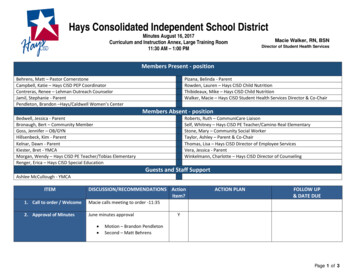


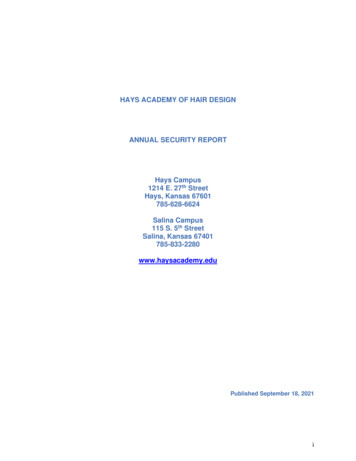

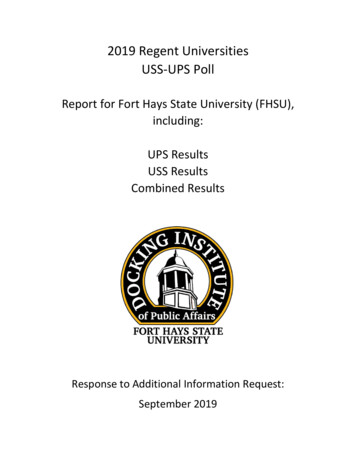
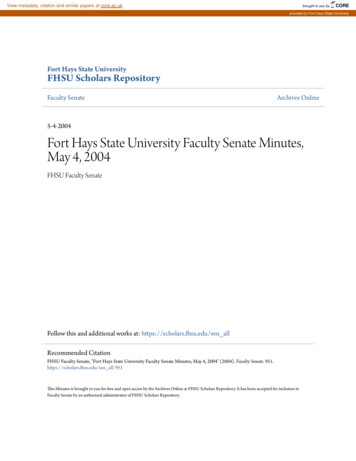
![The Book of the Damned, by Charles Fort, [1919], at sacred .](/img/24/book-of-the-damned.jpg)
